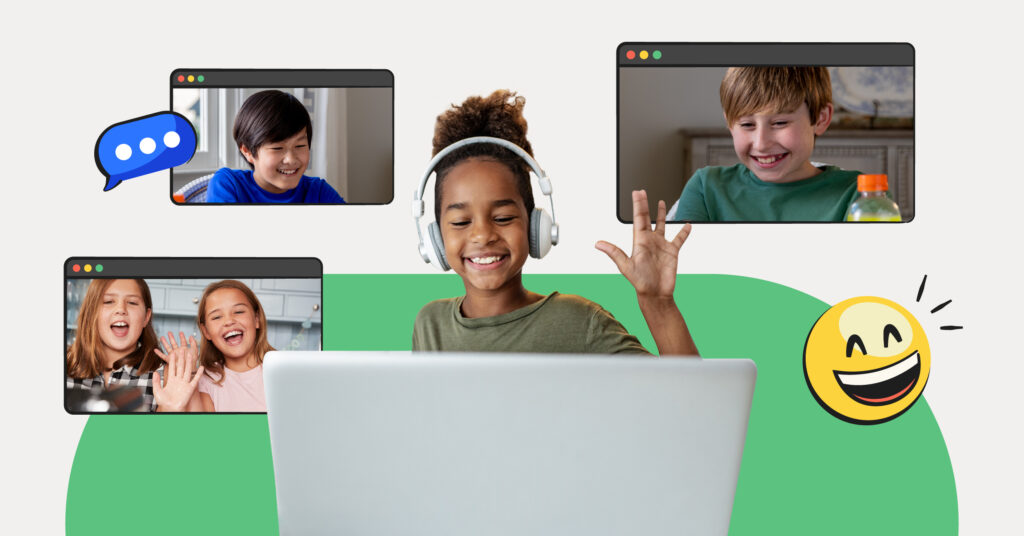
Remember pen pals? Growing in the 80s and 90s, you may have even had one — or knew someone who did. Maybe it was through a program at school, or a friend from summer camp. Today there’s something similar: online friends! Some may be people a kid knows in real life, while others could be entirely online — and they may never actually meet.
Online friendships aren’t inherently bad, and for a generation of kids that had to make do with virtual playdates throughout the lockdown years of the pandemic, they’re part of life. In this post, we’ll discuss some of the pros and cons of these relationships, as well as how you can help protect your kid online and in real life.
Pros of Online Friendships
Increased social connections
Online friendships can help children and teenagers connect with other individuals who share similar interests and hobbies. This can be especially valuable for kids who may struggle to make friends in their local community or who feel isolated or lonely.
Greater accessibility
Online friendships can be formed regardless of geographic location, making it easier for children and teenagers to connect with peers from all over the world. This can be especially beneficial for kids who may not have access to diverse communities or who live in rural or remote areas.
Safe space for self-expression
Online friendships can offer a safe space for children and teenagers to express themselves and explore their identities without fear of judgment or criticism. This can be particularly important for kids who may be struggling with issues like bullying, harassment, or discrimination in their offline lives.
Cons of Online Friendships
Risk of online predators
One of the biggest risks associated with online friendships is the potential for children and teenagers to be targeted by online predators. These individuals may use social media platforms, chat rooms, or other online forums to groom children and gain their trust, often with the intention of engaging in sexual exploitation or other forms of abuse.
Exposure to inappropriate content
Online friendships can expose children and teenagers to a wide range of inappropriate content. This can include simple profanity, violence, hate speech, and extremist propaganda. This can be particularly concerning for parents who are worried about the impact of exposure to such content on their children's mental health and wellbeing.
Lack of face-to-face interaction
Online friendships also lack the benefits of face-to-face interaction, such as the ability to read body language and facial expressions, build trust and empathy, and develop interpersonal social skills. This can be especially concerning for parents who worry about the impact of excessive screen time on their children's development.
Tips for Managing Online Friendships
While online friendships can offer several benefits for kids and teenagers, it's important for parents to take steps to manage and monitor these relationships to ensure their children's safety and wellbeing. Here are a few tips to help parents navigate this complex issue:
Educate your children about online safety
Make sure your children understand the risks associated with online friendships and how to stay safe online. Teach them about the importance of protecting their personal information, setting privacy settings, and avoiding interactions with strangers online.
Notice how your child is acting
Keep an eye on your children's online activity and look for signs of potential risks or dangers, such as unusual or secretive behavior, inappropriate messages or content, or changes in mood or behavior. Online friends may affect how they start to behave, especially if the friend may be a bad influence.
Set clear rules and boundaries
Establish expectations for your child’s online activity with things like limiting screen time, prohibiting certain types of content or interactions, and requiring regular check-ins. We recommend sitting down and filling out a tech contract so everyone is on the same page when it comes to behavior.
Encourage offline socialization
While online friendships can be valuable, it's important for kids to make real-life friends and develop face-to-face relationships with peers. Encourage your children to participate in extracurricular activities, join clubs or organizations, or attend social events in their local community.
How Bark Can Help
Bark is an all-in-one parental control tool that can help you manage nearly every aspect of your child’s online world. You can block websites and apps that may be causing trouble, set up screen time limits to encourage healthy boundaries, and keep an eye on their location.
But Bark’s most powerful feature is our content monitoring. It scans your kid’s texts, emails, and social media platforms for potential dangers and sends you alerts concerning interactions. This way, you can check in and make sure everything is okay if your child is facing issues in online friendships like bullying, depression, online predators, and more. Sign up today for a free, one-week trial.
Read more
Bark helps families manage and protect their children’s digital lives.





